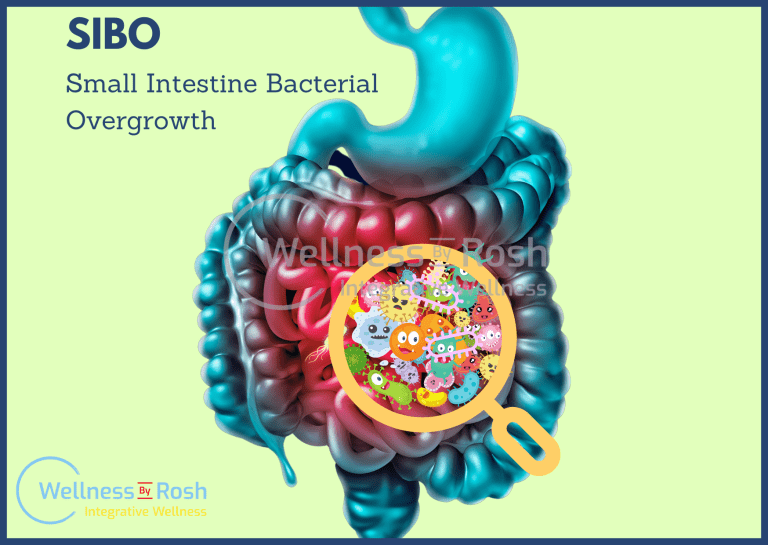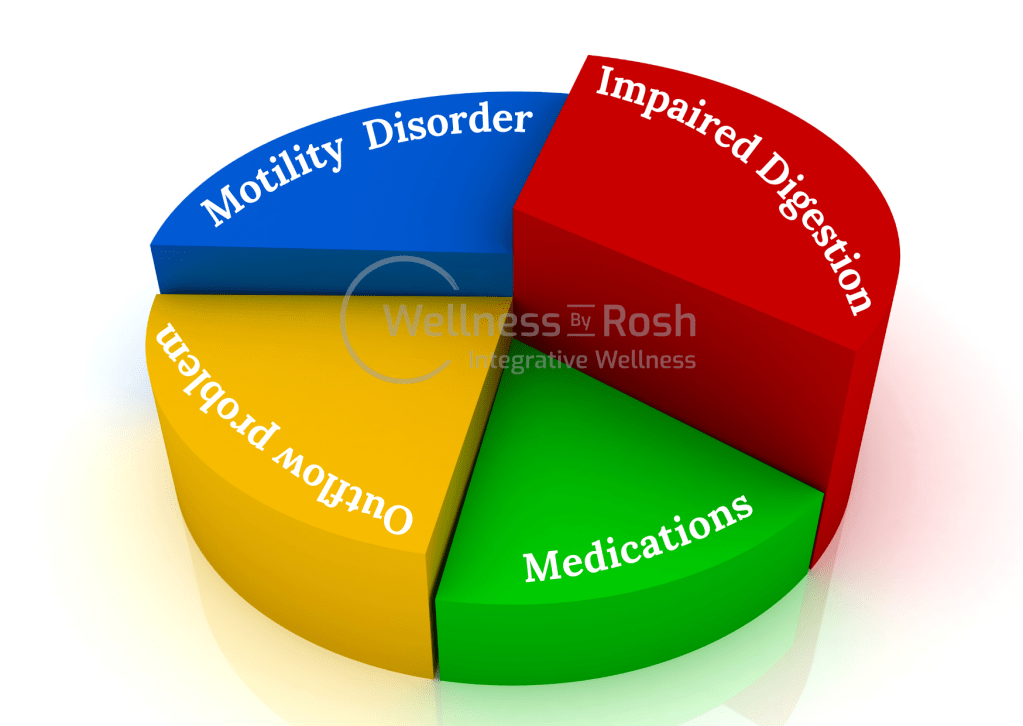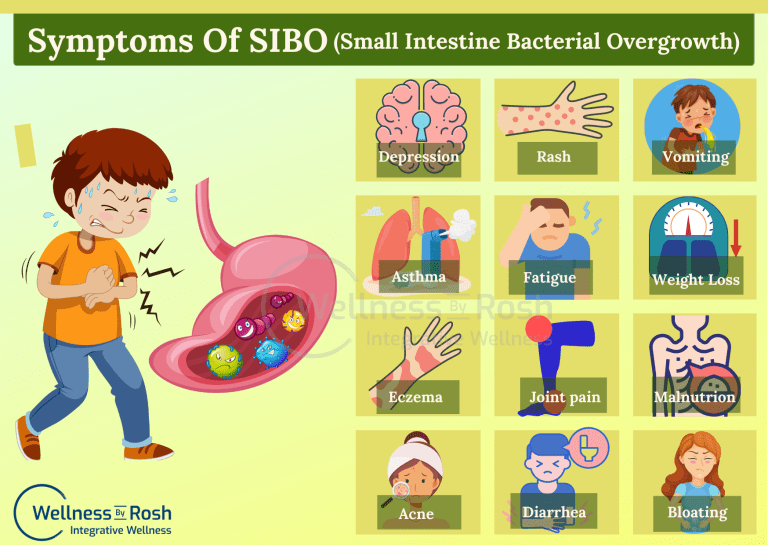Do You have Small Intestinal Bacterial Overgrowth (SIBO)?
Small intestinal bacterial overgrowth commonly known as SIBO, is a digestive imbalance, that may lead to a wide range of health complications such as the leaky gut, nutritional deficiency, and in worse cases liver damage. This blog is all about SIBO including, underlying causes, symptoms and a holistic approach to reverse this gut disorder.

What is SIBO
Small intestinal bacterial overgrowth (SIBO) happens when bacteria (mostly bad one’s) that generally exist in the large intestine start growing in the small intestine. A small intestine is a place where carbohydrate break-down and absorption occurs and it is considered a bacteria-free zone.
SIBO is a serious condition where bacteria grows in the wrong place and in an imbalanced count.
These overgrown bacteria in the small intestine eat partially digested carbohydrates and start fermenting them, this produces hydrogen in higher amounts and causes gas, bloating, diarrhea, and constipation, if not treated it can lead to malabsorption as the bacteria start to use the body’s nutrients, skin issues, and fatigue.
Causes Of SIBO

1. Motility Disorder
The small intestine has a motility pattern every 90 minutes, this cyclic contraction moves indigestible food particles into the colon, this movement is called the migrating motor complex (MMC). Sometimes this motility or contraction got disrupted and does not function properly and causes bacterial growth in the small intestine.
2. Impaired Digestion
In the stomach many factors such as stomach acid, bile, and pancreatic enzyme all work together to create a functioning digestive tract and keep a check on healthy bacteria growth, any digestive disorder of these factors can cause SIBO.
3. Medications
Some medications such as, proton pump inhibitors (Prilosec), narcotics/opioids, cholestyramine, frequent use of antibiotics may affect the normal motility of the small intestine and may lead the digestive disorder like SIBO.
4. Out Flow Problem
Sometimes scar tissue or other factors impaired the flow of food in the intestine, as a result, the bacteria stuck in the small intestine because of moving inability, this causes digestive disorders like SIBO.
Common Symptoms
In SIBO conditions, no specific symptoms can determine the disease, the person can have higher amounts of hydrogen (hydrogen dominant), and methane (methane dominant ). Following symptoms can be considered as bacteria overgrowth:

- Bloating
- Diarrhea
- Acne
- Fatigue
- Vomiting
- Constipation
- Rashes
- Eczema
- weight loss
- Depression
- Asthma
- Clinically deficiency of fat soluble vitamins, B12, iron, excess folate, decreased xylose absorption
Methane Dominant (SIBO-C)
- In our gut, along with bacteria, there are some single-celled organisms also present, known as archaea, and they are not bacteria.
- Bacteria produce hydrogen during carbohydrate fermentation. Archaea feed off that hydrogen and produces methane as a by-product.
- An overgrowth of methane-producing organisms in the small intestine is known as methane dominant.
- Lactose intolerance and improper motility of the GI tract have been directly related to the overgrowth of archaea in the intestine.
- Archaea overgrowth also causes constipation and excessive bloating.
Hydrogen Dominant (SIBO-D)
- As mentioned above, bacteria produces hydrogen as a by product of carbohydrate fermentation in GI tract.
- The presence of hydrogen in large intestine is completely normal.
- But the excess of hydrogen produced in small intestine causes problem and lead to loose stool and diarrhea.
Mixed Type (SIBO-M)
- When methane and hydrogen producers, both are found in small intestine, this condition is known as mixed SIBO condition.
Hydrogen Sulfide Dominant SIBO
- H2S SIBO is H2S-producing microbial species such as Desulfovibrio, Bilophila, and Fusobacteria can proliferate.
- In this condition, the microbes present in the gut produces more hydrogen sulfide gas in excessive amount.
- A High amount of hydrogen sulfide gas can causes damages to cells of the body.
- This typically results in diarrhea or irritable bowel syndrome symptoms with diarrhea.
Reversing SIBO Naturally
One can absolutely reverse SIBO through diet, lifestyle changes and some natural supplements.
Diet
- Food plays an important role in reversing bacterial overgrowth, some dietary changes, such as eliminating high carbohydrate and sugary food may reduce bacterial overgrowth.
- Drinking water reduces the pain and help in smooth digestion.
- Elimination diet followed by anti-inflammatory diet can help to reverse SIBO.
- Low-FODMAP diet or Microbial reset diet can help to reduce symptoms of SIBO.
- Intermittent-fasting between meals and overnight.
Lifestyle Changes
A few changes in lifestyle may helpful in healing the gut, some include:
- Managing stress
- Regular exercise
- Accupuncture
- Eat smaller meal
- Eat mindfully, chew each bite thoroughly
- Stay hydrated, drink plenty of water
Natural Supplements
Natural supplements help to prevent bacterial overgrowth in the gut may include:
- Neem
- Garlic
- Olive leaf extract
- Berberine
- Grapefruit seed extract
- Oregano Oil Capsule
- Wormwood
- Probiotics such as L. Reuteri, B. Coagulans and L. Gasseri
- Herbal antibiotics such as Candibactin-AR and Candibactin-BR
- HCL/Digestive bitters
- N-acetyl cysteine
How TO Know If You Have SIBO
Breath Test is a most popular, simple, and, convenient test to determine if someone has SIBO and what type of overgrowth is there in the gut, hydrogen or methane dominant. there is a device available for self breath testing, through which one can easily do their breath test.
Other tests indicative of SIBO is Comprehensive stool test which examines the flora composition as well as fat malabsorption.
Bottom Line
Small intestine bacterial overgrowth (SIBO), is a common condition in adults and may cause other deficiencies in the future. An effective diet and lifestyle changes along with some supplements can reboot your quality of life, It is scientifically proven that bacteria overgrowth can be reversed totally, but it is equally important to do these changes under the supervision of an experienced and qualified physician or functional medicine practioners.











Why Do We Need Optimal Vitamin-B12 - Wellness By Rosh
10-Nov-21[…] Small Intestine Bacterial Overgrowth (SIBO) […]
How to manage Irritable Bowel Syndrome (IBS) naturally. - Wellness By Rosh | Integrative Wellness
23-Apr-22[…] SIBO or small intestinal bacterial overgrowth is the condition when bacteria present in the gut migrate and populate the small intestine, which may cause gas & bloating, and other discomforts due to the fermentation of digested food in the wrong place of the gastrointestinal tract. […]
Benefits of Allicin
25-Sep-22[…] SIBO has different types like hydrogen dominant SIBO, hydrogen sulfide dominant SIBO and Methane dominant SIBO. Allicin is a primary source of treatment for a type of SIBO called Intestinal Methanogenic Overgrowth(IMO). Allicin is thus majorly used to treat methanogenic archaea which is a type of bacterial overgrowth. These kinds of bacteria are difficult to break down and the allicin extract from garlic is a powerful element to carry out this task. Allicin have shown antibacterial activity against both gram-negative and gram-positive bacteria. […]
SIBO Small Intestinal Bacterial Overgrowth
1-Dec-24[…] Small Intestinal Bacterial Overgrowth (SIBO) is a condition where an abnormal increase in bacteria is present in the small intestine, leading to a range of digestive issues. Normally, the small intestine has relatively low levels of bacteria, but in SIBO, this balance is disrupted, often due to factors like impaired gut motility, structural abnormalities, or a weakened immune system. Conditions like IBS (Irritable Bowel Syndrome) are frequently associated with SIBO, with studies showing that 30-80% of people with IBS also have SIBO, indicating a strong overlap between the two. […]